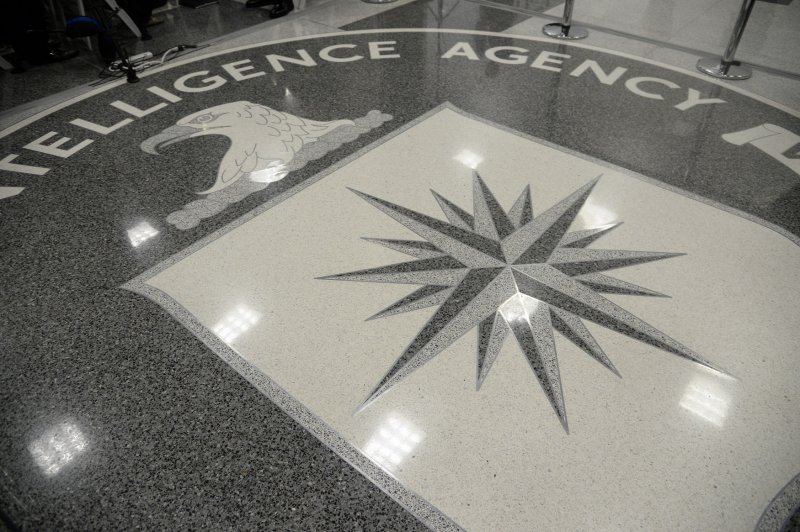The logo of the Central Intelligence Agency is pictured on the floor of CIA headquarters in Langley, Virginia. Pool photo by Olivier Douliery/UPI |
License Photo
Oct. 18 (UPI) -- Democrats on the Senate Intelligence Committee hammered President Donald Trump's nominee to lead the Office of the Inspector General at the Central Intelligence Agency amid reports of whistleblower retaliation and embarrassing intelligence handling procedures.
Christopher Sharpley, a 36-year career government official that has served under multiple administrations, was nominated by President Trump to lead the independent, government watchdog office meant to keep tabs on the covert actions undertaken by the CIA.
Sharpley became the CIA's deputy inspector general in 2012 and has been the CIA's acting inspector general since 2015 after the retirement of David Buckley, who was appointed to the position under President Obama.
Senate Democrats continued to question Sharpley on the Inspector General's 2016 blunder when the office accidentally deleted its only copy of the controversial Senate report about the agency's history of brutal interrogation techniques that some liken to torture in the post 9/11 wars.
Many federal agencies were handed a copy of the Senate Intelligence Committee's full, 6,700-page report. The full version remains classified, but a 500-page executive summary was released to the public in late 2014 sparking condemnation and calls for accountability.
Sharpley told lawmakers the CIA's Inspector General's office received an electronic copy of the Senate study on the CIA's detention and interrogation program in 2014. The report was kept on a classified disk and, Buckley, then the CIA's Inspector General, ordered the report be uploaded into a CIA classified system within the Inspector General's office
However, Sharpley says they received notice that the report should not have been uploaded into the system due to ongoing litigation from a Freedom of Information Act lawsuit filed by the American Civil Liberties Union to release the full declassified report.
An internal email was then sent to an unnamed CIA official, who has since left the Inspector General's office, and the CIA to delete the report from the mainframe and take the disk containing the full Senate report to a safe inside a secret compartmentalized information facility, or SCIF.
"The report was deleted from the system," Sharpley said. "But the individual, the I.T. administrator, did not receive the email."
The standard operating procedure at CIA and its Inspector General's office was that when a report was deleted from the mainframe, the diskette would also be destroyed. Months later, Sharpley would request to know where the disk containing the report was located but no one at CIA or the Inspector General's office could find it. Sharpley, the acting CIA Inspector General by this point, informed the intelligence committees about the missing top secret disk.
The I.T. administrator would tell CIA investigators that his "guess" is he probably destroyed the disk along with other media. After months of speculation and investigation, the disk would later be found when officials looked through a classified safe at CIA. By then, the FOIA lawsuit had determined the report was Congressional property. Sharpley told the committee that it was personally embarrassing for him, and he ended up returning the disk to the committee without having read the Senate report.
"It seems to me it is awfully hard to learn the potential lessons of that report if it was not consumed and read and processed in your office," Sen. Martin Heinrich, D-N.M. told Sharpley during the hearing. "There were chapters that dealt specifically with the operations of the IG's office -- that seems to me to be something you would want to be able to process to make sure that if mistakes were made, they were would not be made again."
Sharpley said that after the missing disk incident, he instituted a new two-authorization procedure at CIA before classified media is destroyed.
Sen. Dianne Feinstein, D-Ca., introduced into the record a report from the Project on Government Oversight alleging that Sharpley has "at least three open whistleblower retaliation cases" pending against him.
The complaints have allegedly been filed with the Intelligence Community's Office of the Inspector General, though Sharpley said he was not aware of these complaints until they were brought forth during the confirmation hearing. He denied ever retaliating against whistleblowers when asked by Sen. Susan Collins, R-Me.
Sharpley is a former U.S. Air Force officer, who received his commission in 1981 and was trained as a special agent, specializing in counterintelligence. He spent 10 years on active duty and 10 years in the Air Force reserves, retiring in 2002.
He then became Deputy Inspector General for investigations and inspections at the U.S. Department of Energy, where he worked for more than 5 years.
Sharpley was also the Deputy Special Inspector General for Investigations at the U.S. Treasury Department and the Federal Housing Finance Agency before joining the CIA in 2012.















